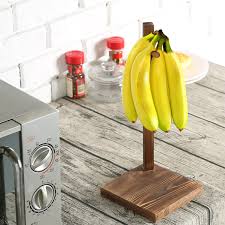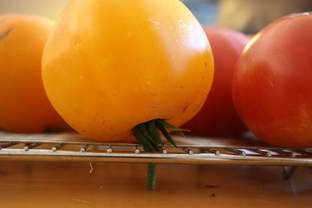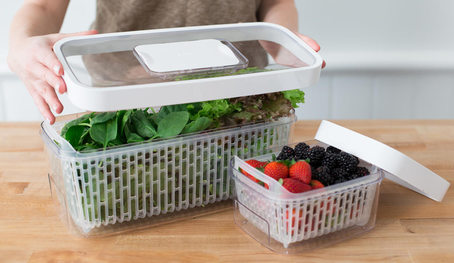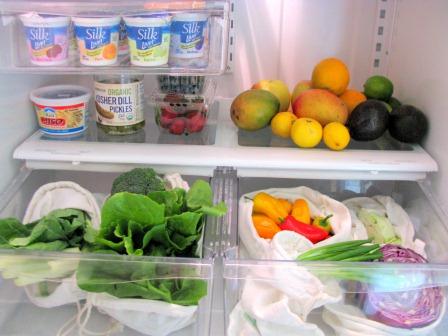 Hang the Bananas! Hang the Bananas! Gone are the days when our mommies and daddies went to the market early in the morning and purchased the required produce for the day’s meals. Such freshly purchased veggies and fruits not only taste great but also save time and effort consumed in storing them. Ironically, these days people don’t even go to market to buy vegetables but order everything online, right from your greens, herbs and spices to the daily produce required for cooking. Even on occasional visits to the farmer’s market or vegetable shop (which is mostly during the weekends) they purchase produce that lasts for more than a week! So, is there an option to keep them fresh or at least prevent them from rotting away inside the comfort of the refrigerators? The vegetable/fruit vendor is always the scape goat who gets blamed for rotten produce that stales away inside our refrigerators before we get a chance to use them. What we miss out is that, every fruit or vegetable has its own qualities. Some fruits give off ethylene gas that can make the other produce ripen and rot faster than it can be consumed. Apricots, avocados, papayas, nectarines, tomatoes, banana, cantaloupe, mango, honeydew melons, peaches, pears, plums, tomatoes and kiwis are the most-common ethylene-producing fruits that must be kept far away from ethylene-sensitive produce such as apples, asparagus, green beans, cucumbers, broccoli, carrots, eggplants, lettuce, potatoes, summer squash and watermelons. Mostly, it is due to improper storage techniques that produce rot away rapidly. Each produce must be stored in a different manner to retain its authentic nutrient qualities. Such careful storage techniques become even more critical when we try to store multiple produce together in the refrigerator. Be the Perfect Host to Your Produce Generally, produce can either be stored on the counter, inside the refrigerator at 40° F or placed on the counter to ripen and then stored inside the refrigerator. Few common mistakes or issues that can affect freshness quotient of produce include:
At room temperature: Bananas, basil, cucumber, eggplant, grapefruit, Beans, potatoes, oranges, lemons, sweet potatoes, Watermelon, tomatoes, zucchini At room temperature but move to the fridge once ripe: Apricots, avocados, papayas, peaches, pears, nectarines, melons, kiwi, mangoes, pineapples, plums Refrigerate: Apples, asparagus, blueberries, corn on the cob, cauliflower, cherries, cilantro, Broccoli, Brussels sprouts, carrots, Dark leafy greens, grapes, leeks, peas, parsley, lettuce, pomegranate, strawberries The job doesn’t end here and we need to clearly understand ‘how’ to store produce as well. In general, remember to store high-ethylene-emitting fruits away from other produce. But, the same set of fruits can also become advantageous when we wish to ripen certain produce faster. For example, if you want to ripen your avocados, you can place them inside a paper bag and keep them right next to the bananas. You would be amazed to find ripe avocados sitting right next to the bananas ready to be used in your smoothies, as a spread or to make some yummy dessert. So, ‘how’ to store your favorite produce? Garlic & Onion: Garlic and onions gel well and bond together as they are both part of the allium family. There is no harm in storing them right next to each other in open containers in a cool, dry and dark space.  Are the Tomatoes Shy to Show their Face? Are the Tomatoes Shy to Show their Face? Mushrooms & Okra: Keep them unwashed in paper bags inside refrigerators as moisture makes them slimy and rot away. Tomatoes: Most of us are inclined to pack any produce into the refrigerator and tomato too faces the same challenge. It is advisable to store them at room temperature (in a bowl away from heat and light) away from the cooling air inside the fridge to prevent quick rotting of the produce. It is even better to keep the stem side down as this prevents moisture from accumulating around the stem and spoiling the entire tomato.  Don't Hurry While Storing Berries Don't Hurry While Storing Berries Potatoes: These stay happy at room temperature. Place potatoes in a cool, dry space in your kitchen but far away from onions or apples (any fruit that emits ethylene) as this can make them wilt and sprout quickly. You can surely grow your own potato garden with the small sprouts that appear on these root veggies if they stay together with onions, even by mistake! Carrots: These have a longer shelf life and can stay fresh up to 2 weeks when placed in an unsealed zip-lock bag in the crisper drawer of the fridge. Peas: Store them in plastic bags Cucumbers: Avoid storing them in fridge but if the need arises never refrigerate them beyond three days. Place them in the front portion of the shelf wrapped in paper towels (you can keep these wrapped ones inside a plastic bag) where the temperature is pretty warm. Leafy greens: Firstly, remove any rotten leaf from the greens before storing and place different greens in different bags. Wrap the leafy greens in paper towels and put them into plastic bags. Banana: You can place them on the counter or use banana hangers to prevent the fruit from ripening too much Berries, cherries and grapes: Any of these fruits must never be washed until you find it essential to use them. Keep them dry in covered containers inside the refrigerator. Citrus fruits: All kinds of citrus fruits can be stored in the crisper drawer or in a mesh bag in the refrigerator. Stone fruits: Plums, peaches and nectarines must be placed in a paper bag on the counter until they ripen and then stored inside the refrigerator. Melons: Watermelons must be stored outside in a cool, dry place. Cantaloupes and honeydews can also be kept outside until they are cut. Herbs: Herbs can be preserved just like flowers, keeping them in a vase filled with water. Before doing that, you can wash them, dry them and cut off the ends. You can even cover the top portion of the herbs with a plastic bag or a damp paper towel as this absorbs moisture. Washing your produce is an art that needs to be mastered. This helps to get rid of as much pesticides and dirt as possible. You can get a list of the top 10 dirtiest and cleanest produce from the website www.firsteatright.com. So, store your produce the right way and wash them properly to enjoy a hearty meal with the essence of fresh and healthy ingredients. This is economical and saves your time too! Comments are closed.
|
AVOID FRAUD. EAT SMART.+91 7846 800 800
AuthorDietitian & Nutritionist Dr. Nafeesa Imteyaz. Archives
July 2024
Categories
All
Dr. Nafeesa's Blog @blogspot |
- Home
- Written Testimonials
- Consult
- Clinics
- Blogs
-
Diet & Nutrition
- Diabetes Reversal
- IVF IUI not needed for PCOS PCOD Infertility
-
Medical Nutrition
>
-
Disease & Conditions
>
- Infertility | PCOS
- Diabetes Mellitus
- Cholesterol
- Hypothyroid
- Kidney Problems
- Hypertension
- Cardiovascular Diseases
- Liver Diseases
- Gastro intestinal disorder
- Cancer
- Metabolic Disorders
- Orthopedic Disorders
- Eating Disorders
- Dietary Recall
- Weight Record Filled By Clients
- Online Payment Transaction Details
- Online Clients Weight Check Form
- Our Program Package Service Charges
- Weight Record 2017 Clients
- Measurements sent by Clients
- Terms & Conditions Of Payment
- Thanks. Your Form is Submitted
- Video Testimonials
- Lifestyle & Wellness
- Lifestyle & Wellness Blog
- Allergy & Intolerance
- Weight Loss / Gain
- Weight Loss / Slimming Blog
-
Disease & Conditions
>
- Life Cycle Nutrition >
- Sports Nutrition >
- Integrity in Nutrition
- Knowledge Centre
© COPYRIGHT 2022. ALL RIGHTS RESERVED. FRST HEALTHCARE PVT LTD.
Dr. Nafeesa Imteyaz of First Eat Right clinic, is the Best Dietitian Nutritionist in Bangalore. Best Dietitian Nutritionist in Pune. Best Dietitian Nutritionist in Hyderabad. Best Dietitian Nutritionist in Chennai. Best Dietitian Nutritionist in Mumbai. Best Dietitian Nutritionist in Delhi. Best Dietitian Nutritionist in Kolkata.


